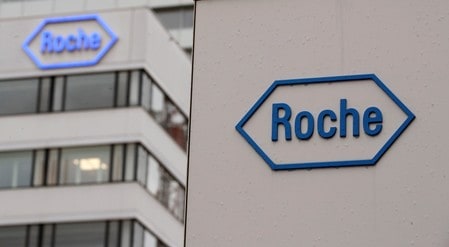By John Miller
ZURICH (Reuters) – Roche has won the U.S. Food and Drug Administration’s breakthrough therapy tag for its drug Gazyva in lupus nephritis, the Swiss drugmaker said on Wednesday, boosting its efforts to recycle the 2013-approved lymphoma medicine for new indications.
There are no FDA-approved drugs for lupus nephritis, a life-threatening manifestation of the autoimmune disease lupus in which the kidneys grow inflamed. Roche has heralded Gazyva’s potential in lupus in helping turn a medicine with 2018 sales of 390 million Swiss francs ($393 million) into a commercial success.
Roche Chief Executive Severin Schwan is counting on rising revenue from medicines including Gazyva to more than offset declining sales of its three biggest drugs, the $22 billion-per-year trio Rituxan, Avastin and Herceptin, as they face competition from copycat medicines.
A decade ago, Roche tried out Rituxan and its multiple sclerosis drug Ocrevus against lupus nephritis, only to be met with what the company describes as “total failure.”
In the wake of the disappointment, its scientists hypothesized that Gazyva, while similar to Rituxan and Ocrevus, had a means of killing B cells associated with lupus that was different enough for it to work where the other two did not.
In a Phase II study whose results were announced in June, Roche said Gazyva in combination with standard of care including corticosteroids resulted in more patients achieving a complete renal response than on standard care alone.
“We are committed to developing Gazyva as a potential new therapy for lupus nephritis and plan to begin enrolling patients in a phase III trial next year,” Sandra Horning, Roche’s chief medical officer, said in a statement.
The Lupus Foundation of America estimates 1.5 million Americans, and at least five million people worldwide, have a form of lupus. Ninety percent of lupus patients are women, and many will develop lupus nephritis.
The FDA’s breakthrough therapy designation is meant to speed development of drugs deemed to have potential advantages over existing therapies for patients with serious diseases. Drugs with the tag get priority review, which can include smaller clinical trials and alternative trial designs.
(This refile fixes spelling of drug ‘Gazyva’ in headline)
(Reporting by John Miller; Editing by Michael Shields)


